Recipes created for the Irish Food Writers’ Guild Food Awards 2023 by head chef Deniss Laskeno of Suesey Street, Fitzwilliam Place, Dublin 2, showcasing the 2023 award winners.
Ballylisk Triple Rose | Balsamic caviar | Pan de Cristal
Serves 4
- 60g Ballylisk Triple Rose
For the balsamic caviar:
- Vegetable oil, enough to fill a container for dipping
- 200g balsamic vinegar
- 50g sugar
- 1.1g agar agar
For the Pan de Cristal:
Makes 4 medium (5” x 7”) breads.
Polish ingredients:
- 100g bread flour (T665)
- 100ml warm water
- 2g active dry yeast
- 5g sugar
Bread ingredients:
- 400g bread flour (T665)
- 250ml warm water
- 5g active dry yeast
- 15g olive oil
- 10g salt
- 10g sugar
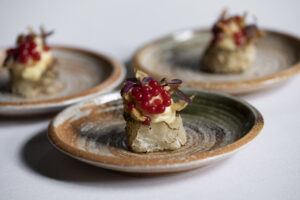
To prepare the Ballylisk Triple Rose:
- Trim the cheese wheel on all sides to remove any hard or dry areas.
- Cut the cheese into small pieces and place them in a piping bag.
- Bring the cheese in the piping bag to room temperature by placing it in a warm spot in your kitchen or holding it in your hands for a few minutes. Gently knead the piping bag to soften the cheese and make it easier to pipe.
- Once the cheese is soft and pliable, cut off the tip of the piping bag to the desired size and begin piping.
- You can use the piping nozzles to add a decorative touch to crackers or bread, or to fill small pastry shells or canapés.
To make the balsamic caviar:
- Start by preparing the oil. Fill a container with vegetable oil and place it in the freezer until it reaches a temperature of 4°C.
- In a small saucepan over medium heat, reduce the balsamic vinegar by half. This should take around 10-15 minutes.
- Once the balsamic vinegar has been reduced, add the sugar and agar agar to the saucepan. Stir well to combine.
- Bring the mixture to a simmer and cook for 5 minutes, stirring occasionally.
- Remove the saucepan from the heat and let it cool down for 5 minutes.
- Once the mixture has cooled down, transfer it into a syringe or a squeeze bottle.
- Take the container with the chilled vegetable oil out of the freezer. Slowly drip the balsamic mixture into the cold oil, forming small spheres.
- Allow the spheres to rest in the oil for about 30 seconds, then use a slotted spoon to remove them from the oil.
- Place the spheres onto a paper towel to drain the excess oil.
- Repeat the process with the remaining balsamic mixture until you have created the desired amount of spheres.
- Serve the balsamic caviar immediately as a garnish or a topping for salads, meats, or desserts.
To make the pan de cristal:
- The day before you want to make the bread, make the polish: mix all the polish ingredients until there are no lumps, cover and place in the fridge to cold-proof for 24 hours.
- Next day, combine polish and the remaining bread ingredients in a large bowl. Mix well using a dough hook in a mixer on high speed for 20 minutes or until the mixing bowl is clean and dough is not falling off the hook.
- Transfer the dough to a greased bowl, cover and let it proof for 45 minutes.
- After the first proof, knead the dough for 10 seconds and let it rest for another 45 minutes.
- Repeat the kneading and resting process twice more, for a total of three proofs.
- Oil your hands, shape the dough into 4 medium 5” x 7” loaves and place on a well-floured French baking cloth. Proof for a further 30 minutes on the cloth.
- Preheat the oven to 200°C and place a baking tray in the oven to heat up.
- Transfer the dough onto the hot baking tray and place the tray in the oven.
- Add a few ice cubes to the bottom of the oven to create steam for the first 10 minutes of baking.
- After 10 minutes, reduce the oven temperature to 160°C and bake for another 15 minutes or until the bread is golden brown.
- Remove from the oven, flip the loaves upside down and let cool before slicing and serving.
To assemble: Cut pan de cristal bread into 1cm slices and use a small cutting ring to cut desired canapé sizes out of the slices. Pipe Ballylisk Triple Rose on top of the bread and garnish with balsamic caviar and air-dried shallot segments.
Aran Island Honey & Cranberry Goats’ Cheese | Balsamic Bramley Apple Chutney
Makes 12
For the filling:
- 100g Aran Island Honey & Cranberry Goats’ Cheese
- 50g double cream
- Pinch of salt
- 50g Ballylisk Balsamic Bramley Apple Chutney
- 1 large sweet potato
- Vegetable oil for frying
For the tartlet shortcrust pastry:
- 250g plain flour
- 125g butter, diced and kept cool in the fridge
- Pinch of salt
- 1-3 tbsp milk or water
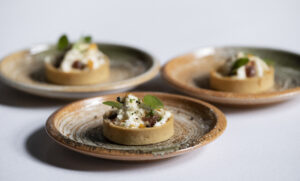
To make the filling:
- In a mixing bowl, whisk together the Aran Island Honey & Cranberry Goats’ Cheese, double cream and pinch of salt until smooth.
- Transfer the mixture into a siphon and charge it with 2 cartridges.
- In a blender, blitz the Balsamic Bramley Apple Chutney until it becomes smooth. Put into piping bag.
- Peel the sweet potato and slice into thin, skinny chips using a mandoline or sharp peeler.
- Heat vegetable oil in a deep pan over medium heat until it reaches 150°C.
- Fry the sweet potato chips in small batches until golden brown and crispy. Remove from the pan and place them on a paper towel to drain any excess oil.
To make the pastry:
- Sift the plain flour into a large bowl or the largest bowl of a food processor. Add the diced butter and either rub in with your fingertips, or, if using a food processor, pulse until until the mixture resembles fine breadcrumbs. Add the salt and mix again.
- Gradually add the liquid by starting with 1 tbsp milk or water, then adding a little more until the mixture comes together to form a dough.
- Tip the mixture onto a surface and gently bring it together with your hands, then shape into a disc.
- Wrap in cling film and chill for at least 20 minutes before using.
- Roll the dough as thin as possible on a lightly floured surface and line 12 pastry moulds or a 12-hole tart tin. Dock with a fork and chill for 1-2 hours.
- Preheat oven to 180°C. Bake for 20-25 minutes until the pastry is golden brown.
- Allow to cool and gently remove from the tins.
To assemble: pipe Aran Island Honey & Cranberry Goats’ Cheese into tartlet. Dots chutney on top and crumble sweet potato chips over the canapés.
Smoked Lough Neagh Eel | Velvet Cloud Sheep’s Yoghurt Mousse | Dill
Serves 4
For the smoked eel:
- 100g Smoked Lough Neagh eel
- 2-3 tbsp wasabi yuzu
- Smoked trout caviar, to garnish
For the smoked eel rillettes:
- 100g smoked eel, or excess trimmings reserved
- 50g Velvet Cloud sheep’s milk yogurt
- 10g fresh dill, chopped
- 10g salt
- 10g olive oil
For the garlic oil:
- 1 head of garlic
- Chive trimmings
- 10-20g each fresh parsley and dill
- 1/2 cup of neutral oil (such as vegetable or canola oil)
For the sheep’s milk yogurt mousse:
- 100g Velvet Cloud sheep’s milk yogurt
- 5g salt
- 1g white pepper
For the rye bread:
- 16g active dry yeast
- 600ml warm water
- 150ml molasses
- 1 teaspoon caraway seeds
- 1 tablespoon salt
- 4 tablespoons vegetable oil
- 35g cocoa powder
- 240g rye flour
- 600g bread flour
For the sweet dill pickled cucumber:
- 2 medium-sized cucumbers
- 100g white vinegar
- 100g water
- 100g granulated sugar
- 100g fresh dill
- 10g salt
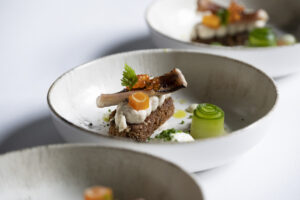
To prepare the eel:
Trim the eel and portion it into thumb-sized portions. Brush with wasabi yuzu and lightly char with blow torch.
To make the rillettes:
- Finely chop the reserved eel trimmings and set aside.
- In a food processor, combine the sheep’s milk yogurt, chopped dill, salt, and olive oil.
- Pulse the mixture until it is well blended and smooth.
- Add the reserved eel trimmings and pulse a few more times until they are incorporated into the mixture.
- Transfer the smoked eel rillettes to a bowl and refrigerate for at least 30 minutes to allow the flavours to meld together.
To make the garlic oil:
- Preheat oven to 180°C.
- Remove any loose outer layers of skin from the garlic. Place it in a baking dish and roast in the preheated oven for 20 minutes.
- Once the garlic is done roasting, remove it from the oven and let it cool until you can handle it.
- Cut off the stem of the garlic and squeeze out the garlic cloves into a blender.
- Add chive trimmings and fresh herbs such as parsley and dill (if available) to the blender.
- Pour oil into the blender.
- Blitz the mixture until smooth.
- Pass the mixture through a fine sieve to remove any solids.
- Transfer the garlic oil to a clean jar or bottle, and store in the refrigerator for up to 2 weeks.
To make the sheep’s milk yogurt mousse:
- In a mixing bowl, combine the sheep’s milk yogurt, salt, and white pepper.
- Mix the ingredients well until the mixture is smooth and uniform in texture.
- Transfer the mixture into a siphon or whipped cream dispenser.
- Charge the siphon with 2 whipped cream chargers according to the manufacturer’s instructions.
- Shake the siphon vigorously for a few seconds to distribute the gas throughout the mixture.
- Chill the siphon in the refrigerator for at least 30 minutes or until the mixture has set.
To make the rye bread:
- Dissolve the yeast in the warm water with the molasses. Put yeast mixture into a large metal bowl. Add the caraway seeds, salt, vegetable oil, cocoa powder, rye flour and then 240g of the bread flour, mixing into the yeast mixture.
- Add more bread flour, a cup at a time, until the dough is not so sticky, and it is too hard to mix it with the spoon. At that point, spread a half cupful of flour onto a large, clean, flat surface and put the dough onto the surface.
- Knead additional bread flour into the dough until it reaches the right consistency. Knead for 5-7 minutes, or until the dough is smooth and elastic.
- Spread some vegetable oil around a large bowl and place the dough in it, turning it so it gets coated in the oil.
- Cover the bowl with plastic wrap or a damp cloth. Let rise at room temperature until it has doubled in size, 1 to 1 1/2 hours.
- Gently press down on the risen dough so some of its air is released. Turn the dough out onto a lightly floured surface, knead the dough a few turns and then divide it by cutting it in half with a sharp knife.
- Shape each half into a loaf. Place loaves into an oiled 8×4-inch loaf tin. Let the bread rise again, this time not doubling in volume, but rising by about half.
- Pre-heat oven to 180°C. Bake for 40-50 minutes, or until done. The bread should sound hollow when tapped.
To make the sweet dill pickled cucumber:
- Wash and thinly slice the cucumbers using a mandolin or peeler.
- In a small pot, mix together the vinegar, water, and sugar. Bring the mixture to a boil over medium-high heat, stirring occasionally to dissolve the sugar.
- Once the sugar has dissolved and the mixture has come to a boil, remove the pot from the heat and add in the fresh dill. Stir well.
- Place the sliced cucumbers into a clean jar or container that can be sealed. Pour the hot pickling mixture over the cucumbers, making sure they are completely submerged.
- Let the pickled cucumbers cool to room temperature before sealing the container and refrigerating for at least 30 minutes before serving.
- The pickled cucumber can be stored in the refrigerator for up to 2 weeks.
To assemble: cut rye bread to desired shape. Lightly toast on the pan. Place toasted bread in a bowl and season with salt, chives and garlic oil. Toss to coat. Pipe some smoked eel rillettes on the bread. Place smoked eel on top and garnish with sea trout caviar and sweet dill pickled cucumber. Serve with the sheep’s milk yogurt mousse.
The Wooded Pig Coppa-Wrapped Monkfish | Broad Beans | Peas | Charred Baby Leeks | Morels
Serves 4
- 800g monkfish
- 100g-120g The Wooded Pig Coppa
For the brine:
- 60g granulated sugar
- 30g salt
- 15g light brown sugar
- 1 litre water
- 2g ground black pepper
- 1g garlic powder
- 10g Worcestershire sauce
- 1 fresh bay leaf
For the morel sauce:
- 100g fresh morels
- 10g butter
- 10g garlic, finely diced
- 10g shallots
- 100ml Madeira
- 10g salt
- 2g black pepper
- 100ml double cream
For the vegetables:
- 150g peas, blanched and refreshed
- 150g broad beans, blanched and refreshed
- 12 baby leeks, trimmed, blanched and refreshed
- A little white wine
- Half of a lemon
- Butter
- Olive oil
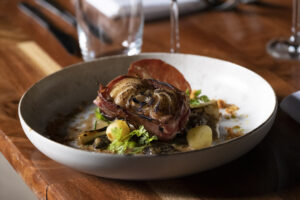
To prepare the monkfish:
- To get your monkfish ready for brining, trim the tail, hold the skin with a towel in your hand, and pull it from the flesh like you would remove your socks.
- Place all ingredients for brine in a large pot and bring to the boil.
- Remove from the heat and allow to cool completely.
- Submerge monkfish in brine and leave in fridge for 24 hours.
- After removing monkfish from the brine, wash in ice cold water for a few minutes. Pat dry and place in the fridge to air dry for 2-5 hours.
- Wipe down the workstation with a damp cloth to keep the surface slightly wet. This will help the cling film to stick to the table, preventing it from sliding around as you work.
- Place a layer of cling film onto the working surface, ensuring that it covers the surface completely. Lay an even layer of coppa on top of the cling film, making sure that it is at least twice as wide as the thickness of your fillet. This will ensure that the coppa evenly covers the entire fillet.
- Using the clingfilm, carefully roll the coppa and fillet into a tight roulade, being sure to squeeze out any excess air as you go. Once you have rolled it to your liking, tie off both ends tightly.
- Steam at 63°C for 7 minutes. Once it has been cooked, place it into a bowl of ice water to stop the cooking process. When it has cooled, cut into four portions.
To make the morel sauce:
- Start by cleaning the morels with a soft brush to remove any dirt or debris. Cut off the bottom part of the stems if they are tough and discard.
- Heat a saucepan over medium heat and melt the butter. Add the diced garlic and shallots and sauté until softened and fragrant.
- Deglaze the pan with Madeira and bring to a boil, stirring occasionally.
- Add the cleaned morels to the pan and stir to coat them in the sauce. Season with salt and black pepper.
- Pour in the double cream and reduce the heat to low. Simmer the sauce for about 5-7 minutes, stirring occasionally, until it has thickened and reduced by half.
- Once the sauce has thickened, remove the pan from the heat and let it cool for a few minutes.
- Transfer the morel sauce to a blender and blend until smooth. If the sauce is too thick, you can add a little water or more cream to thin to your desired consistency.
To prepare the vegetables:
- Preheat the oven to 180°C.
- Pan fry the monkfish portions to a golden colour on a hot pan, ensuring a delightful sear on all sides.
- Carefully transfer monkfish to an oven tray and add a drizzle of lemon, a splash of white wine, and a dollop of butter on top of each piece.
- Place the monkfish in the oven and cook for 7-10 minutes, depending on the size of the fish. We aim to reach a temperature of 73°C, probing the fish close to the bone to ensure the entire piece is cooked to perfection.
- Reheat the broad beans and peas in a sizzling sauté pan over medium high heat with a touch of butter or olive oil and season them with salt.
- We prefer to char our baby leeks over an open flame, but feel free to use your preferred method of cooking.
To assemble: place morel sauce on the plate and lay vegetables on top. Finish with the coppa-wrapped monkfish and delicate, fresh microgreen leaves.
Lemon Cheese Cream with Velvet Cloud Sheep’s Milk Granita | Shortbread | Mango Ginger Gel
Serves 4
For the lemon cheese cream:
- 75g icing sugar
- 150g Ballylisk Triple Rose
- 130g cream cheese
- 60ml lemon juice
- Zest of 1/2 lemon
½ vanilla pod - 2 gelatine sheets
- 150g double cream
- 80g white chocolate
For the carrot base:
- 200g gluten free flour
- 10g bicarbonate of soda
- 1 tbsp mixed spices
- 1 tbsp cinnamon
- 140g eggs – approx 3 medium eggs
- 200g caster sugar
- 140g sunflower oil
- 200g cranberries, blitzed into smaller pieces
- 400g finely grated carrots
- 120ml lemon juice
- 100ml dark rum
- 1 tbsp vanilla extract
For the mango ginger gel:
- 20g sugar
- 2g agar agar
- 200g mango purée
- 20g lemon juice
- 1 teaspoon fresh ginger, grated on microplane
For the shortbread crumble:
- 150g gluten free flour
- 100g butter
- 50g sugar
- 1 teaspoon vanilla
- 1/2 teaspoon cinnamon
For the Velvet Cloud sheep’s milk granita:
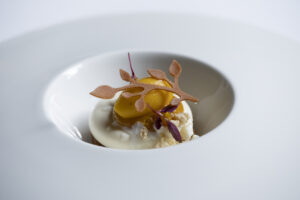
- 300ml Velvet Cloud Sheep’s Milk yogurt
- 100g icing sugar
- 50ml lime juice
- 1 tsp honey
To make the lemon cheese cream:
- Combine icing sugar, Ballylisk Triple Rose, cream cheese, lemon zest and juice in a bowl.
- Bloom the gelatine sheets in cold water for 5-10 minutes.
- Bring cream to the boil and pour it over chocolate. Add gelatine while it is still warm and mix.
- Add cheese mixture, stir well and pour into 4 moulds.
To make the carrot base:
- Preheat oven to 170°C. Oil and line a 23 x 23cm square tin with baking parchment.
- Sift flour, bicarbonate of soda and spices into a bowl.
- Place eggs and sugar in a stand mixer bowl. Mix on high speed until pale.
- Add oil and mix at a slower speed until combined. Add cranberries, carrots, lemon juice, rum and vanilla.
- Finish by folding in dry ingredients.
- Spread into tin and bake for 12 minutes.
To make the mango ginger gel:
- Combine sugar with agar agar in a small saucepan, add in mango pureé and lemon juice.
- Bring to a boil while constantly stirring. Boil for 2 minutes.
- Pour on a tray, cool down completely and blitz.
To make the shortbread crumble:
- Preheat oven to 170°C.
- Butter and line a a baking tin with with baking parchment.
- Add all ingredients to a stand mixer bowl and beat until combined. Spread on baking tin.
- Bake for 15-20 minutes until golden.
To make the granita:
- Whisk all ingredients together. Spread on a tray and put in the freezer.
- Every 10-15 minutes, take out of the freezer and use a spoon to scrape it into small shards.
To assemble: cut carrot base into desired shape. Top with lemon cheese cream, granita, shortbread crumble and mango ginger gel.
